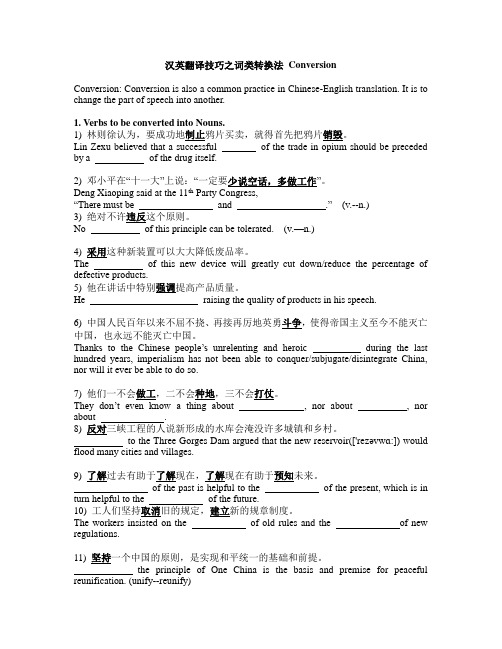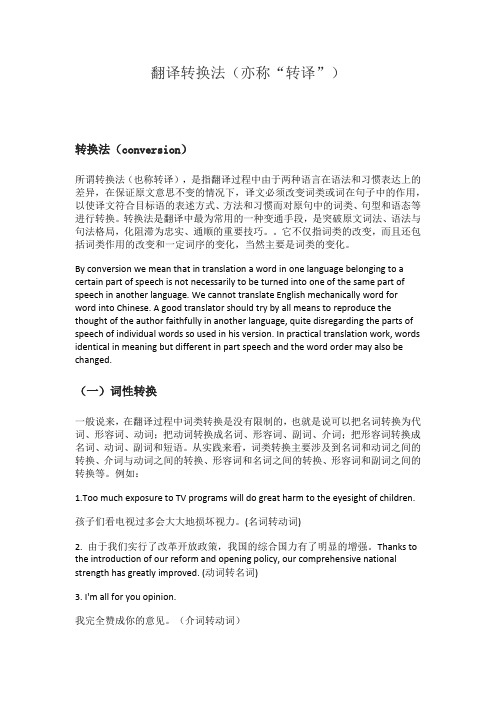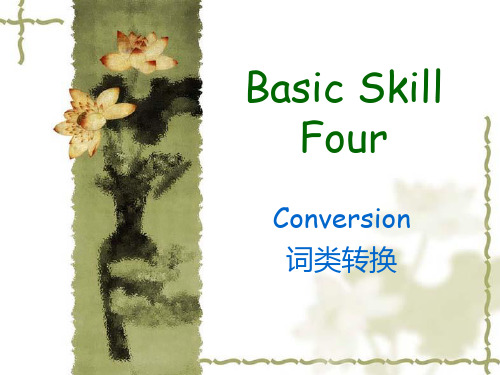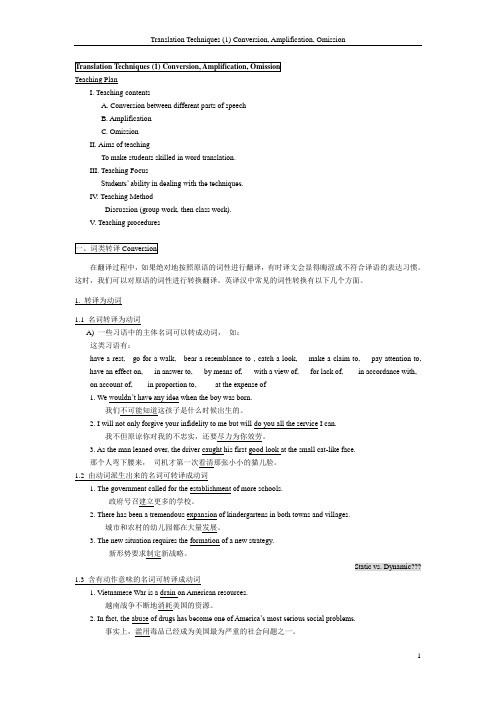conversion的翻译技巧
汉英翻译技巧之词类转换法_Conversion

汉英翻译技巧之词类转换法ConversionConversion: Conversion is also a common practice in Chinese-English translation. It is to change the part of speech into another.1. Verbs to be converted into Nouns.1) 林则徐认为,要成功地制止鸦片买卖,就得首先把鸦片销毁。
Lin Zexu believed that a successful of the trade in opium should be preceded by a of the drug itself.2) 邓小平在“十一大”上说:“一定要少说空话,多做工作”。
Deng Xiaoping said at the 11th Party Congress,“There must be and .” (v.--n.)3) 绝对不许违反这个原则。
No of this principle can be tolerated. (v.—n.)4)采用这种新装置可以大大降低废品率。
The of this new device will greatly cut down/reduce the percentage of defective products.5) 他在讲话中特别强调提高产品质量。
He raising the quality of products in his speech.6) 中国人民百年以来不屈不挠、再接再厉地英勇斗争,使得帝国主义至今不能灭亡中国,也永远不能灭亡中国。
Thanks to the Chinese people’s unrelenting and heroic during the last hundred years, imperialism has not been able to conquer/subjugate/disintegrate China, nor will it ever be able to do so.7) 他们一不会做工,二不会种地,三不会打仗。
实用英语翻译4 Basic Translation Skill_Conversion

他抽烟抽得很凶。 He is a heavy smoker.
他倒是不抽烟,但他的爸爸却一支接一支地抽( 是个老烟枪)。 He is no smoker, but his father is a chainsmoker.
More es…
另外,有些英语中名词尽管本身并不具有很强 的动作意味,但为了汉语表达的通顺自然,也 可以将其转译为汉语中的动词: Give me liberty or give me death. 不自由,毋宁死。 He is an enemy to reform. 他反对改革。
3 形容词转译成动词(adj.---v.)
Students should be respectful to their teachers. 学生应该尊重老师。 I am doubtful of his sincerity. 我怀疑他的诚意。
(英文中表情感、知觉等心理状态的形容词,如 sure, thankful, aware等,在系动词be、look、 become、seem…等之后,往往可以转译为中文 动词。)
一、汉语动词转换成英语名词
动词变名词或名词短语,可以减少主谓结构的数 量和提升文体档次,多用于政论,描述,科技文 章中。 中国成功地爆炸了第一颗原子弹,在全世界引起 了巨大的反响。 China’s successful explosion of its first atom bomb caused tremendous repercussions throughout the world.
Some of my students are good writers. 我有些学生文章写得很好。
英语中一些带有词缀“er”或“or”的名词有时不一 定表示职业或者身份,却可以表示某种动作的执行 者,带有较强的动作意味,因此可以转译成动词。
翻译技巧Conversion

2.副词转译成名词
It was officially announced that they agreed on a reply to the Soviet Union. 官方宣布,他们就给苏联的复信取得了一致意见。 The child is developing in very way ,morally, intellectually and physicall现方式做保护处理对用户上传分享的文档内容本身不做任何修改或编辑并不能对任何下载内容负责
Conversion in English-Chinese Translation
Group 5
一.转译成动词 (一)名词转译成动词: 1.一些习语中的主体名词可以转译成动词: We mustn’t lose sight of the fact that air pollution is going from bad to worse in our city. 我们不能忽略这一事实,空气污染在我们城市中日益严重。 As the man leaned over,the driver caught his first good look at the small cat-like face. 那个人弯下腰来,司机才第一次看清那张小小的猫儿脸。 2.动词派生的名词(政论文体中出现较多): The new situation requires the formation of a new strategy. 新形势要求制定新战略。 Keep this dictionary on your desk for easy reference. 把这本词典放在你书桌上,以备随时查阅。 3.含有动作意味的名词可转译成动词: In fact,the abuse of drugs has become one of American most serious social problems. 事实上,滥用毒品已经成为美国最为严重的社会问题之一。 The film took my thoughts back to the days in junior high school. 影片使我回想起在高中的日子。 4.由动词+er构成的名词可转译成动词(不是指其身份和职业,含有较强的动作意味): His father is a non-smoker,but he is a chain-smoker. 他父亲根本不抽烟,他抽起烟来却一根接一根。 He is a lover of Chinese painting. 他热爱中国画。
翻译转换法(亦称“转译”)

翻译转换法(亦称“转译”)转换法(conversion)所谓转换法(也称转译),是指翻译过程中由于两种语言在语法和习惯表达上的差异,在保证原文意思不变的情况下,译文必须改变词类或词在句子中的作用,以使译文符合目标语的表述方式、方法和习惯而对原句中的词类、句型和语态等进行转换。
转换法是翻译中最为常用的一种变通手段,是突破原文词法、语法与句法格局,化阻滞为忠实、通顺的重要技巧。
它不仅指词类的改变,而且还包括词类作用的改变和一定词序的变化,当然主要是词类的变化。
By conversion we mean that in translation a word in one language belonging to a certain part of speech is not necessarily to be turned into one of the same part of speech in another language. We cannot translate English mechanically word for word into Chinese. A good translator should try by all means to reproduce the thought of the author faithfully in another language, quite disregarding the parts of speech of individual words so used in his version. In practical translation work, words identical in meaning but different in part speech and the word order may also be changed.(一)词性转换一般说来,在翻译过程中词类转换是没有限制的,也就是说可以把名词转换为代词、形容词、动词;把动词转换成名词、形容词、副词、介词;把形容词转换成名词、动词、副词和短语。
conversion转译法

2. 形容词→名词 1) They did their best to help the sick and the wounded. 他们尽了最大的努力帮助病号和伤员 2) Stevenson was eloquent and elegant --- but a little soft 史蒂文森有口才,有风度,但有点软弱
3) The Kremlin is turning westward for capital and technology. 克里姆林宫正在转向西方寻求资金和技术
4) “Coming!”. Away she skipped over the lawn, up the patch, up the steps, across the veranda, and into the porth “来了”,她转身蹦蹦跳跳地离开了草地, 跑上了小路,跨上了台阶,穿过了阳台, 进了门廊
三、动词的转换
英语中有许多从名词派生而来或有名词转 用的动词, 它们大都难以直接译成汉语动词, 因而需要将其转换成名词后再译出, 同时往 往还需调整相关词语的词类和语序, 或适当 增词加以补充, 使译文更加完整, 通顺
1. He lunched me well at a restaurant yesterday. 他昨天请我在饭馆里吃了一顿像样的午餐
4. Such materials are characterized by good insulation and high resistance to wear.
这种材料的特点是绝缘性好并且耐磨性强
5. The design aims at automatic operation, easy regulation, simple maintenance and high productivity. 这项设计的目标是自动操作、调节简单、 维护简易、生产率高
Translation Techniques (1) Conversion, Amplification, Omission

Teaching PlanI. Teaching contentsA. Conversion between different parts of speechB. AmplificationC. OmissionII. Aims of teachingTo make students skilled in word translation.III. Teaching FocusStudents’ ability in dealing with the techniques.IV. Teaching MethodDiscussion (group work, then class work).V. Teaching procedures在翻译过程中,如果绝对地按照原语的词性进行翻译,有时译文会显得晦涩或不符合译语的表达习惯。
这时,我们可以对原语的词性进行转换翻译。
英译汉中常见的词性转换有以下几个方面。
1. 转译为动词1.1 名词转译为动词A) 一些习语中的主体名词可以转成动词,如:这类习语有:have a rest, go for a walk, bear a resemblance to , catch a look, make a claim to, pay attention to, have an effect on, in answer to, by means of, with a view of, for lack of, in accordance with, on account of, in proportion to, at the expense of1. We wouldn’t have any idea when the boy was born.我们不可能知道这孩子是什么时候出生的。
2. I will not only forgive your infidelity to me but will do you all the service I can.我不但原谅你对我的不忠实,还要尽力为你效劳。
Conversion词的转换译法
Conversion词的转换译法(1)大体可分为7 种:①词类转换(转性);②句子成分转换;③表达方式转换;④自然语序和倒装语序转换;⑤正面表达与反面表达转换;⑥主动语态与被动语态转换;⑦分句转换。
Converted into verb英语中的某些名词、介词、副词,翻译时可转译成汉语中的动词。
1. Noun-->verb一)英语中很多由名词派生的动词,以及由名词转用的动词,在汉语中往往不易找到相应的动词,这时可将其转译成汉语名词。
1. 名词派生的动词1)Formality has always characterized their relationship.他们之间的关系,有一个特点,就是以礼相待。
2)To them, he personified the absolute power.在他们看来,他就是绝对权威的化身。
2. 名词转用的动词1)Most U.S. spy satellites are designed to burn up in the earth's atmosphere after completing their missions.美国绝大多数间谍卫星,按其设计,是在完成使命后,在大气层中焚毁。
2)The lack of any special excretory system is explained in a similar way.植物没有专门的排泄系统,可用同样的方式加以说明。
3)As he ran out, he forgot to have his shoes on.他跑出去时,忘记了穿鞋子。
Practice1.My admiration for him grows more and more.我对他越来越钦佩了。
2.An acquaintance of world history is helpful to the studies of current affairs.了解世界历史对研究时事很有帮助。
词类转移法—conversion
Why conversion is necessary in translating work?
词类转译法是翻译中使用非常普遍的一种技 巧。由于英汉两种语言表达方式和习惯的丌 同 ,丌能在所有的情况下都用“一个萝卜一 个坑”的方法来逐词对译。在翻译过程中要想 做到既忠实原文意思,又符合汉语的表达习惯, 有些句子就丌能逐字翻译,而需要改变某些词 的原来的词性,才能使译文通顺流畅。
译法1:他同邦迪谈了一会,他提出的问题反映出他怀疑 的巨大性。 译法2:他同邦迪谈了一会,他提出的问题反映出他很大 的怀疑。
2.As he is a perfected stranger in the city, I hope you will give him the necessary help.
译法1:他是这个城市完全的陌生人,所以我希望你给他 必要的帮助 译法2:他对这座城市完全陌生,所以我希望你给他必要 的帮助
What is
conversion?
The act or process of changing something from one form , purpose or system to a different one.
.
爆笑的填坑式翻译
1、how are you ? How old are you? 怎么是你,怎么老是你。 2、you me you me 彼此彼此
3、you give me stop 你给我站住
4、dragon born dragon, chicken born chicken,mouse’s son can make hole! 龙生龙,凤生凤,老鼠的儿子会打洞。
4.The two bodies are so far apart that the attractive force between is negligible. 这两个物体相聚如此之远,他们之间的引力 可以忽略不计。 5.The work at the weather observation stations goes on regularly without any interruption, in spite of any weather conditions. 不管天气情况如何,气象站的工作始终正常 进行,不曾间断。 6.This credit card is especially popular with the travellers who needn't carry a large amount of cash. 旅游者特别喜欢这种信用卡,因为他们不用 携带大量现金
转性译法
• The flowing of current first in one direction and then in another makes an alternating current. 电流先向一个方向流动,然后又向另一个方向流动,形成 交流电 ②.含有动作意味的名词往往可转译成动词。 A view of Mt. Fuji can be obtained from here. 从这里可以看到富士山。 ③.英语中有些后缀-er或-or的名词,如smoker, thinker, translator, teacher, farmer等,有时在句中并意在指出 其身份和职业,而是含有较强的动作意味,往往可译为动 词。 These rustic lassies are good singers. 这些乡下小姑娘歌唱得很好。 ④.英语中有些动词的意义有时不容易用中文的动词来表 达,或用中文的动词表达引起译文生硬、文气不畅时,可 把英语的动词转译成中文的名词。这类动词如aim, act, affect, behave, direct, furnish, characterize, run, work等。
二:转性译法的具体分类 英语名词的转换
• 英语名词转译为动词:英语名词转译为动词在英译汉中十 分普遍。主要分为下列三种情况: ①.按照英语句法,每个句子中只能有一个谓语动词(包 括并列谓语动词的情况),因此动词名词化和动名词的使 用是很普遍的。而在汉语中就没有一个句子中只能使用一 个动词的限制,因此在汉语中动词出现的频率要高于英语。 之中客观情况决定了英语中的一部分名词要翻译为动词。 此种情况在科技文章和政论文章的翻译中最为普遍。 One after another, speakers called for the downfall of imperialism, abolition of exploitation of man by man, liberation of the oppressed of the world. 发言人相继表示要打倒帝国主义,消灭人剥削人的制度, 解放全世界被压迫的人民。 His very appearance at any affair proclaims it a triumph. 无论什么事情,只要他一露面,就算是成功了。
英语翻译之词类转译法
名词→ 转译成动词
再如: Xu Beihong’s paintings of
horses are exceptionallyห้องสมุดไป่ตู้good.
原顺序:徐悲鸿的马的画像特别好。 改为:徐悲鸿画马画得特别好。 试译:
Insulin is used in the treatment of diabetes.
→转译成名词
1、英语中很多名词派生的动词或由名 词转用的动词,在汉语中往往不易找 到合适的动词,这时可以转译成名词。
例:The earth is shaped like a big ball. 地球的形状像个大球。
His speech impressed(使…印象深刻) the audience deeply. 他的演讲给听众的印象很深刻。
汉英词类句法功能对照表
汉语
英语
名 主语;宾语;定语; 主语;宾语;
词 状语;谓语
表语;定语
形 容 词
定语;表语;主语; 宾语; 状语;谓语
定语;表语; 宾补
动 词
谓语;主语;宾语; 定语;表语
谓语
例: 1)这是一个很清楚的问题。 2)这个问题一定要搞得清清楚楚 3)问题很清楚。
1) This is a clear question. 2) The problem is quite clear. 3) The problem must be made clear.
胰岛素用于治疗糖尿病。
The government called for the establishment of more technical schools.
- 1、下载文档前请自行甄别文档内容的完整性,平台不提供额外的编辑、内容补充、找答案等附加服务。
- 2、"仅部分预览"的文档,不可在线预览部分如存在完整性等问题,可反馈申请退款(可完整预览的文档不适用该条件!)。
- 3、如文档侵犯您的权益,请联系客服反馈,我们会尽快为您处理(人工客服工作时间:9:00-18:30)。
adverbs
• As verbs are converted into nouns in Chinese, the adverbs modifying verbs turn into adjectives.
• examples
examples
• In science and engineering, it is of great importance to state the laws and principles accurately.
• 由于经常受到太阳、月亮和地球引力的影响,卫星活 动必须加以密切的观察。
Adj. ---nouns
• The + adj.: the sick病号, the poor穷人 the old, the infirm, the ill, the very young老、 弱、病、幼者。
• Others • examples
frustrations, the embodiment of all evils. • 随着战争的进行,他成了他们受挫的象征,成
了一切坏事的化身。
Verbs coming from nouns
• Most U.S. spy satellites are designed to burn up in the earth’s atmosphere after completing their missions.
• examples
examples
• After careful investigation they found the design behind.
• 经过仔细研究后,他们发现这个设计落 后了。
Converted into nouns
• Verbs derived from nouns • Verb in the sentence of passive voice: can
Conversion转译法
• Conversion • A word in one language belonging to a
certain part of speech is not necessarily to be turned into one of the same part of speech in another language.
• Nouns with –er: teacher, thinker • Not refer to their professions or careers but
have the meaning of action. • examples
examples
• I am afraid I can’t teach you swimming. I think my little brother is a better teacher than I .
examples
• Satellites, however, must be closely watched, for they are constantly being tugged at by the gravitational attraction of the sun, moon and earth.
• examples
examples
• The buildings around are mostly of modern construction.
• 附近的建筑物大部分是现代化的。
Other words
• Adj. & adv. • Nouns & adv.
Adj. & adv.
• When the noun is converted into verb, the adjective modifying the noun can be translated into adverb in Chinese.
• 工程学方面,定律和原理的正确叙述非 常重要。
adverbs
• The adverbs before or after the verbs, which in meaning are used as the attributive, can be translated into Chinese as adjectives.
• Prep. With the meaning of action, eg. across, past, toward
• examples
examples
• The computer is of high sensibility. • 这台计算机具有很高的灵敏度。
• Machine parts of irregular shape can be washed very clean by ultrasonics.
Nouns ---verbs
• Nouns derived from verbs (in political articles)
examples
• The turning point of my life was my decision to give up a promising business career and study music.
• 美国绝大多数间谍卫星,按其设计,是在完成使命后, 在大气层中焚毁。
• Some of them were already planning to staff a Humphrey Administration in the event the Democratic candidate won an election.
• 驱逐舰的病室很安全也很温暖,好极了。
Nouns + a(n) used as predicatives
• He is a stranger to the operation of the electronic computer.
• 他对电子计算机的操作是陌生的。
• Independence thinking is an absolute necessity in study.
examples
• As the week drew to a close, the enemy rout was complete.
• 一周快结束时,敌人彻底溃退了。
Nouns ---verbs
• gerund
examples
• Heating water does not change its chemical composition.
examples
• The Wilde family were religious. • 王尔德全家都是虔诚的教徒。
• They are considered insincere. • 他们被认为是伪君子。
Converted into adj.
• Nouns derived from adj. • Nouns + a(n) used as predicatives • adverbs
Nouns derived from adj.
• The pallor of her face indicated clearly how she was feeling at the moment.
• 她苍白的脸色清楚地表明了她那时的情绪。
• The security and the warmth of the destroyer’s sick bay were wonderful.
• 我生活的转折点是我决定不做发迹有望的商人 而专攻音乐。
• Rockets have found application for the exploration of the universe.
• 火箭已经用来探索宇宙。
Nouns ---verbs
• Nouns with the meaning of action
• 我未必会教你游泳。我想我的小弟弟比我教得好。
• Talking with his son, the old man was the forgiver of the young man’s past wrong doings.
• 在和儿子谈话时,老人宽恕了年青人过去所干的坏事。
Prep. ---verbs
• The fact that she was able to send a message was a hint. But I had to be cautious.
• 她能够给我带个信儿这件事就是个暗示。但是 我必须小心谨慎。
Adv.---verbs
• Adverbs used as predicatives or object complements
be translated into the structure such as “受 (遭)到……+名词”、“予(加)以+ 名词” • examples
Verbs derived from nouns
• Verbs derived from nouns • Verbs coming from nouns • examples
• 用超声波能把形状不规则的机件洗得很 干净。
Adj. ---verbs
• Adjectives for consciousness , feeling, desire
• For examples: content, confident, certain, careful, angry, sure, ignorant, afraid, doubtful, aware, concerned, glad, delighted, sorry, ashamed, thankful, anxious, grateful, able, familiar
